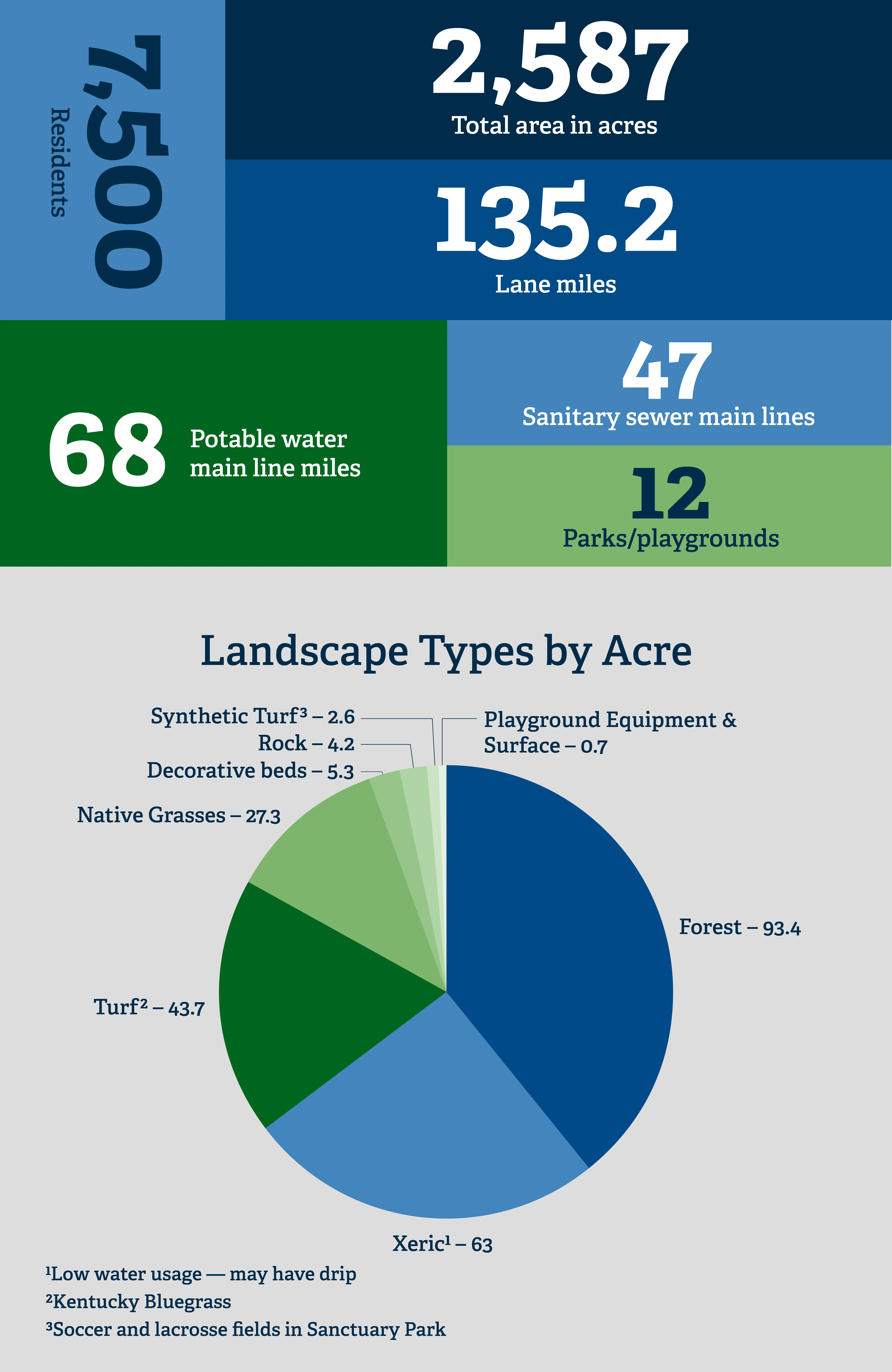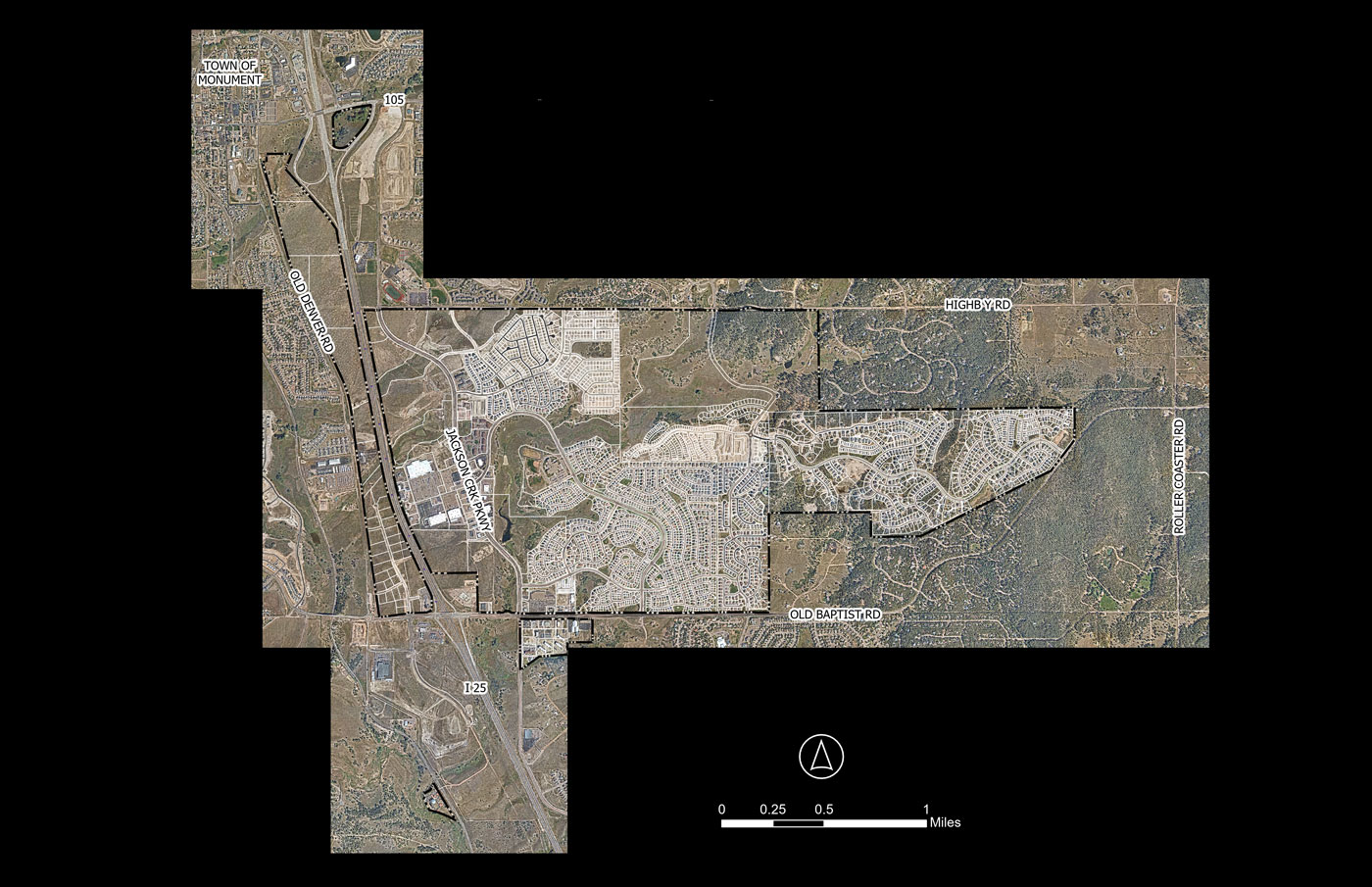About the District
Formed in 1985, Triview Metro District is a quasi-municipal corporation and operates much like a town. We provide essential services including water, wastewater and stormwater services, and the maintenance of roads, parks and open spaces. We are responsible for building, operating and maintaining the community’s public infrastructure. We generate revenues by levying fees and charges, collecting taxes and issuing bonds. Triview strives to maintain and enhance the value of our more than 2,300 single-family homes, 790 multi-family residential units and 80 commercial customers. Triview also sets construction standards for public facilities and conducts inspections to ensure quality. Our focus is to maintain and enhance the community’s value through responsible stewardship and forward-thinking infrastructure management.
The district is approximately 2,587 acres in size, of which more than half is developed or currently under construction. Most of the development in the district is being used as or is planned for residential property. The single-family residential developments within the district are being completed by Campbell Homes, Challenger Homes, Lokal Homes, Richmond Homes, Tralon Homes, Toll Brothers, Vantage Homes and Saddle Tree Homes. At full build-out, the district is expected to be home to 3,032 single-family homes, 1,556 multi-family apartment units, 162 duplex units, 131 senior living apartments and approximately 100 commercial businesses. The district currently anticipates the residential buildout to be completed in approximately five years, with commercial buildout to be completed in approximately 10 years.

Triview by the Numbers
Triview Metropolitan District by the Numbers
- Total area: 2,587 acres
- Number of residents: approx. 7,500
- Lane miles: 135.2
- Potable water main line miles: 68
- Sanitary sewer main lines: 47
- Parks/playgrounds: 12
Landscape Types by Acre
- Forest: 93.4
- Xeric: 61 (low water usage – may have drip)
- Turf: 43.7 (Kentucky Bluegrass)
- Native grasses: 27.3
- Decorative/flower beds 5.3
- Rock: 4.2
- Synthetic turf: 2.6 (soccer and lacrosse fields in Sanctuary)
- Playground equipment and surface: 0.7
Services Provided
Triview provides five core services to our residents: Water; wastewater and stormwater services; road maintenance, repair and plowing; park maintenance; and open space preservation. Specifically, we:
- Provide water to homes and businesses
- Provide collection and treatment for sewage from homes and businesses
- Operate stormwater facilities, including detention ponds (from rain and other sources that drain into a street drainage system where it flows to streams and creeks)
- Provide mosquito control for our open spaces
- Maintain roads (paving, plowing, repairing and replacing roads)
- Maintain parks and open spaces
- 10 public parks (mowing, watering) along with streetscapes and medians
Triview owns, operates and maintains:
- 10 Denver Basin wells
- Two water tanks: a 1.5 million-gallon concrete water tank and a 1.1 million-gallon tank
- 68 miles of water pipelines
- 47 miles of sewer pipelines
- Irrigation systems for parks and open spaces
Additionally, we’re the majority shareholder in the Upper Monument Creek Wastewater Treatment Plant.
Funding and Debt Service
Triview is funded through monthly bills sent to residents for water and wastewater services, as well as through sales tax revenue collected from retailers located within the district. We are responsible for debt service payments for historical debt dating back to the formation of the district in 1985, and that is funded by the 20.5-mill property tax. We collect property taxes from every house and commercial establishment in the district, and that money can only be used to pay down our approximately $40 million in historical debt. Thanks to the voters of the Triview Metro District, the district has the ability to assess up to 6.5 mills for Operations and Maintenance of the district’s streets and park and open space facilities. In 2025, 6.5 mills have been allocated to operations and capital improvements, including Higby Road improvements. As the district grows, this Operations and Maintenance mill levy will be available for additional road improvements, landscape enhancements and other projects.
What Triview Doesn't Do:
- Set speed limits
- Provide police or fire protection
- Planning and zoning
All of these items are the responsibility of the Town of Monument.

